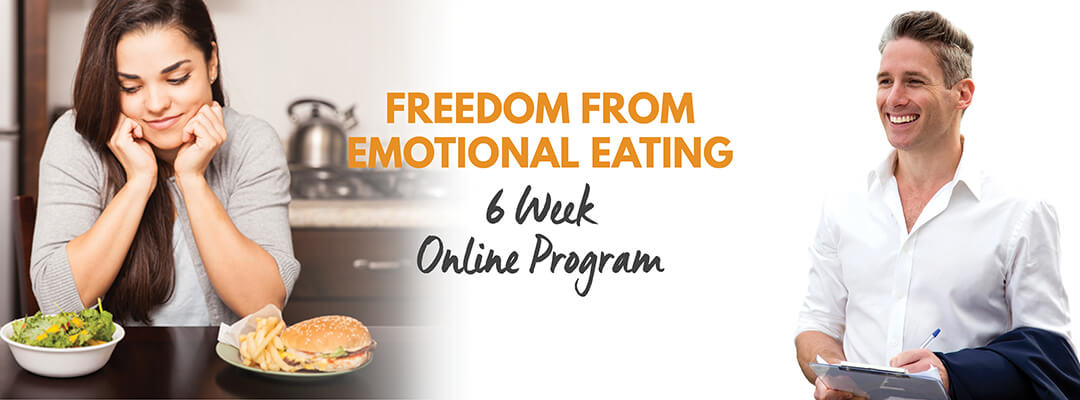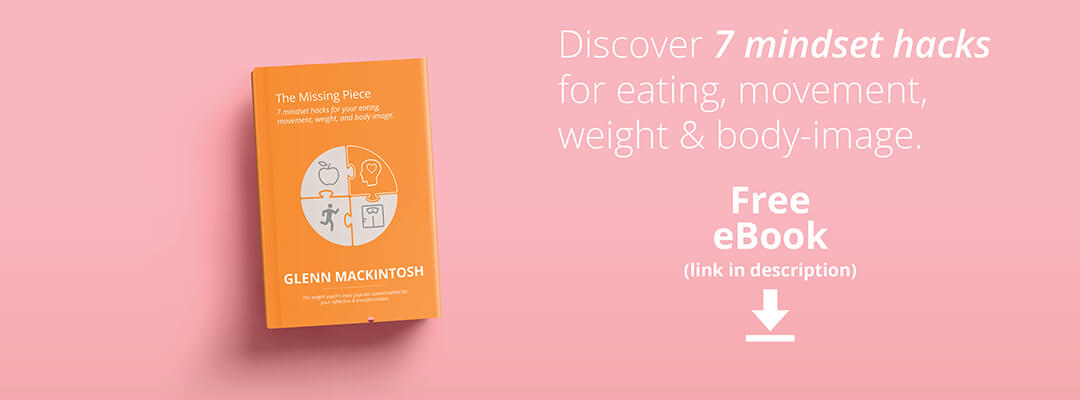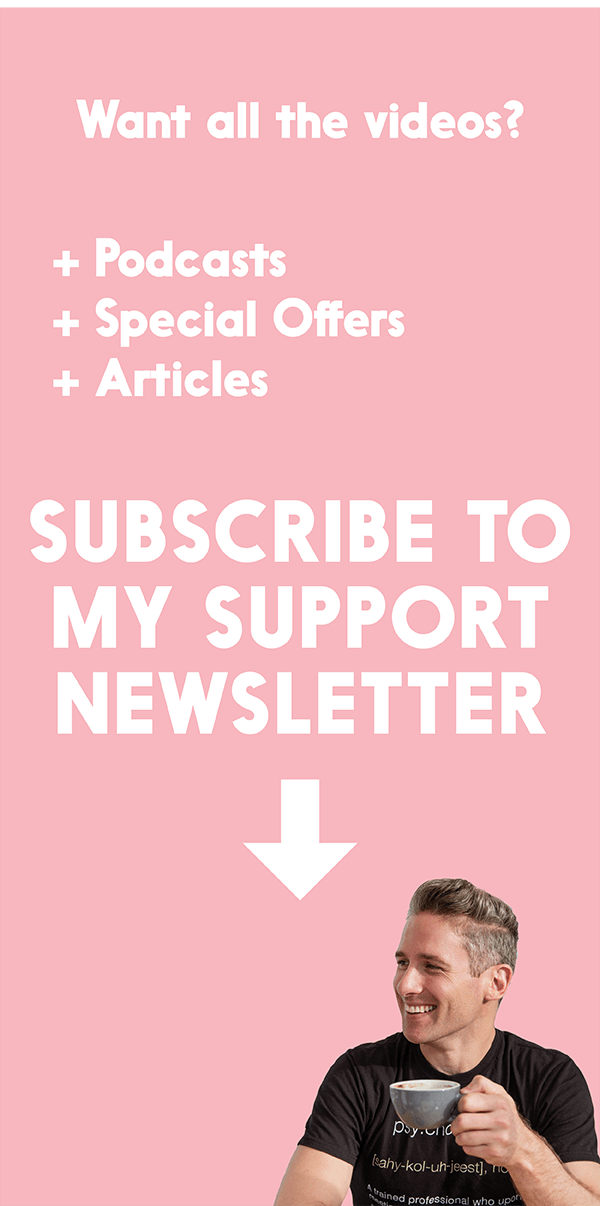
Emotional eating is impacts your headspace AND your waistline. So what actually is emotional eating, why do you do it, and most importantly, HOW DO YOU STOP?
In this juicy 20-minute interview super trainer and trainer from The Biggest Loser: Transformed, Libby Babet and Weight Management Psychology Founder Glenn Mackintosh discuss:
✔︎ What emotional eating IS (and how it differs from just loving food)!
✔︎ How emotional eating habits develop (it may not be what you think).
✔︎ Why Ben & Jerry’s is NOT your second boyfriend.
✔︎ The first step to freeing yourself from emotional eating.
✔︎ Libby’s #1 way to feel better without eating!
✔︎ How to shock yourself out of “Zombie Eating” and make better choices
✔︎ How to unlock “More Marvellous Methods to Manage Your Moods”
✔︎ Glenn’s favourite quick tip for if you feel like emotionally eating.
✔︎ How Lib & Glenn have “poo days” (and how we deal with them).
Watch Video
I created this video for people just like you.
If you found it valuable, please help me share it with them!
If you love this chat and feel like you need a helping hand to fully experience the benefits of freedom from emotional eating for yourself, we have a 6-week fully online program that will help you say goodbye to emotional eating forever, learn many more marvelous methods to manage moods, and feel a lot better as you let go of habits that were no good for your headspace (or your waistline)!
Find out more about Freedom from Emotional Eating
Links from Video:
Balloon Model of Emotional Eating
More Marvellous Methods to Manage Your Moods List
TRANSCRIPT
Libby: Hi, everyone. My name is Libby Babet and I’m here for another chat on the couch with the wonderful Glenn Mackintosh. I said your name today.
Glenn: Yeah, change it.
Libby: That’s a nice change, isn’t it? Glenn is known as the weight psych. A lot of you will already be aware of his work, but he is here to give us lots of helpful tips … did I say ticks? Yes, some ticks, too, but lots of helpful tips to help us get healthier, and most importantly, happier. Right?
Glenn: Absolutely.
Libby: Now, today we are talking about how to get freedom from emotional eating, and this is another one of your courses that you run online, Freedom From Emotional Eating, and I just love the name of it, because I work a lot with women, and this is something that comes up quite frequently with the girls I work with, which is, “I’m an emotional eater.”
“I can’t help it, I’m an emotional eater.” All this kind of stuff, and-
Glenn: It’s a big label.
Libby: It’s a label, isn’t it? And so, I just wanna talk about that. I mean, I guess we can start with what is emotional eating?
Glenn: That’s a good question, because obviously there are all types of emotions. Some people eat when they’re happy, some people eat when they’re sad. When a psychologist talks about emotional eating, what we’ll be talking about today is eating to deal with the unpleasant emotions.
Libby: Eating to deal with the unpleasant emotions. Yeah, makes sense.
Glenn: Yeah, so it’s if you’re feeling bad, soothing yourself with food. It’s not enjoying yourself, socialising, maybe eating a little bit too much. This is the stuff where you’re not feeling so good and you’re kinda using food to kind of medicate yourself, in a way.
Libby: Yeah. It’s the old, “My boyfriend was nasty to me, I’m gonna pick up my other boyfriends Ben & Jerry on the way home and eat them on the couch.”
Glenn: Your other boyfriends Ben & Jerry?
Libby: Ben & Jerry is ice cream. Ben & Jerry’s ice cream?
Glenn: The other boyfriends. I’m thinking about, “You’re gonna go to the other boyfriend’s place?”
Libby: No, no, no, no, no.
Glenn: Like, no wonder the boyfriend is mean to you.
Libby: No, I meant the type of ice cream.
Glenn: I understand, yes.
Libby: Just had to clarify that.
Glenn: Me too. It’s like, makeshift boyfriend. “This boyfriend is reliable.”
Libby: Reliable.
Glenn: “This boyfriend never lets me down.”
Libby: Delicious.
Glenn: And emotional eating is a bit like that. Like, people often say to me, “Glenn, I’m a smart person. Why can’t I get on top of this?” And I think it’s quite understandable, because even though most people end up feeling worse after they emotionally eat, for that little period, you do feel better.
Libby: You do, because you get a little sugar high, or you get a little happiness burst out of doing something you enjoy.
Glenn: Yeah, and so it can become a little addiction, but emotional eating can be so problematic because it does end up, 95% of the time, making you feel worse.
Libby: Yeah. At least after that blissful ten-minute window has passed.
Glenn: Totally. Most people … I mean, we research it. Say, if you’re stressed, or you’re angry, or you’re lonely, the mood goes down while you eat and then comes back up after, but I say it’s like double dipping on a bad mood when you emotionally eat, because you feel bad. Say I feel stressed. Now I eat-
Libby: And I feel stressed about eating.
Glenn: Exactly. Now I’m stressed with a side order of guilt.
Libby: Yeah. And guilt is not fun.
Glenn: Yep. And the other thing about emotional eating, why it is important to work on, is because, in psychologist language, it’s a maladaptive coping strategy, which means that it actually doesn’t help you solve the problems. You know, if you had a fight with a boyfriend, you go to Ben & Jerry’s, it’s probably not gonna make you feel … this is gonna go the whole way through. I’m running with this.
I’m leaning into this metaphor.
Libby: Ben & Jerry’s, here to stay.
Glenn: But, after Ben & Jerry’s, you’re gonna feel guilty.
Libby: Yes. It doesn’t fix the fight.
Glenn: And it doesn’t fix the problem, and you don’t go and reconnect with-
Libby: Yes. Ben & Jerry’s does not help you reconnect with the one you love, people. They’re not psychologists.
Glenn: And that’s what I say to people. There is no nutritional solution for an emotional problem, and that’s really the start of being free from emotional eating, is recognising that no matter what I’m feeling, whether I’m stressed, or sad, or tired, or lonely, or angry, the answer is not a nutritional answer.
Libby: Yeah. No, I agree. Okay, cool. So, okay, that’s what emotional eating is. It’s eating to try and make yourself feel better, when really, that’s kind of a maladaptive strategy. It’s not gonna work.
So, I know that you have actually created, I guess, a method or a process for other dieticians, psychologists, trainers like me, to use to help people overcome emotional eating. What is that kind of strategy about?
Glenn: I developed a little model to help you kind of get what’s happening as it’s happening, because you’ll hear clients say this all the time. They’re like, “Okay, I plan to eat well, but then this happened. I had a big day at work,” for example, “and I just went into autopilot, zombie mode, just started eating everything and afterwards I kinda became like, ‘Oh my god.'”
Libby: I came out of the fuzz and there I am, yeah?
Glenn: “I really shouldn’t have done that.” And so I created this model to help you understand what’s happening to you in real time, as it’s happening, and I call it the balloon model.
Libby: Oh, I like balloons. That’s good.
Glenn: Yeah. So we’ll provide a link to it so you can see how it’s drawn up.
Libby: Yeah. That’ll be great.
Glenn: But basically, I want you to think of all of your … we’re gonna get a bit deep. All of your unpleasant emotions. All of your sadness, and fear, and uncertainty, as existing inside a balloon.
Libby: Okay, good.
Glenn: And you’ve got certain inputs into this balloon. I think of ’em like straws going into the balloon, so maybe if you’ve got a stressful job, that’s gonna blow the balloon up. Maybe if you have had a fight with your boyfriend, that’s gonna blow the balloon up. Psychologists call these things stressors.
And some people have little balloons. They don’t have much tolerance for unpleasant emotions. Some people have bigger balloons and they can deal with a lot of stuff, but everyone’s balloon has a limit, and at some stage it just gets too big, it’s too much, and you gotta let it out.
Libby: Yeah. Or your balloon will burst.
Glenn: Or the balloon will burst. So, you gotta let it out, and for a lot of us, we’ve been doing it since literally seconds after we were born, you start to emotionally eat, and we confuse that process of getting nutrition and getting emotional comfort, and as adults, we just figure out our own ways of doing this that we’ve done since kids.
Libby: Giving ourselves the rewards in ways to make ourselves feel better.
Glenn: Totally. Yeah, it starts just after we’re born, and our parents further that in-built pattern that we have in our brain. You know, you go to the doctor, you get a needle-
Libby: You get a jellybean or something, yeah.
Glenn: It’s like, this needle or something. It’s like, “Oh, big, scary doctor!” Then your jellybean. “Ah.”
Libby: Yeah. “Ah, phew. I feel better.”
Glenn: You know, you scrape your knee. It’s like, “Oh, have an ice cream.” And so it’s a very natural and normal thing to do. So, if you are an emotional eater, please don’t beat yourself up.
Libby: We all do it.
Glenn: It’s a normal thing to do. Doesn’t mean that it’s that helpful.
Libby: Doesn’t mean you can’t stop doing it.
Glenn: Doesn’t mean you can’t stop doing it, but the thing is, when the balloon gets too big, a lot of people, the let off valve is food.
Libby: Yeah. Okay.
Glenn: The problem is, though-
Libby: Donuts, undoing the valve.
Glenn: The donut comes back into the balloon. So it doesn’t get … this, like, “Oh, I feel better. Oh, now I’m back to feeling bad.”
Libby: So it’s like you’ve let an intruder into your balloon. It’s like, “Let me undo this for the pressure valve.” And a little bit, the air gets out, and then it goes, “Fooled you.”
Glenn: Straight back in. Yeah, so it doesn’t work. It works only just for that brief little period, but in the longterm it’s not really helping you deal with your feelings.
Libby: Yes, makes sense.
Glenn: So, as part of the balloon model, what we wanna do is we wanna develop some new valves.
Libby: Yes, okay.
Glenn: I haven’t asked you this, Lib, but I would bet money that one of your valves is exercise.
Libby: Definitely. In fact, we’ve talked about this. Like, you know, I’m five months pregnant at the moment, and whilst I’ve … in the first kind of trimester, where I couldn’t exercise, I actually found it so much harder to manage my emotional state. You know, I’d get down, I’d be like, “There’s nothing I can do to make this better,” because going for a walk, or a workout, or whatever it is, is one of my things.
Glenn: Yep, absolutely. So that’s what we want. We wanna … I call these things more marvellous methods to manage your moods.
Libby: Oh, I like it.
Glenn: Yep, so we wanna develop a whole series of let off valves, whether it be physical activity, or passive things like meditation, or learning to communicate with people. You know, get it off your chest.
Libby: Yeah. I know reading fiction books is one of mine, too.
Glenn: Yeah. There are a million different things that you can do, and I like for people to have a variety of strategies. Actually, I’ve got a little more marvellous methods to manage your moods sheet that, when you listen to this, you can brainstorm some of your own ideas, and you chuck it up … I’m just looking at Libby’s fridge.
Libby: Yeah, at my fridge. On the fridge.
Glenn: You chuck it up on the fridge and you will be in that zombie mode, and then it will shock you into-
Libby: “These are the things I can do.”
Glenn: Yeah.
Libby: Yeah, I love that.
Glenn: “‘Cause the answer’s not here.”
Libby: Yeah, that’s cool.
Glenn: So there’s really kinda three parts to working with the balloon model. The first part is developing these more marvellous methods, then the second part is actually looking at those things that are feeding into the balloons, actually dealing with your life.
Libby: Making them dissolve, a little.
Glenn: Yep. I say to people, “You often start the emotional eating work with me to stop emotional eating, but you actually end up changing your life in far more profound ways.”
Libby: Yes, which is incredible.
Glenn: Yeah, it’s really incredible, and it is one of those things we say in psychology, “What gets you in the door is not always what the most important thing is.”
Libby: Yes, indeed.
Glenn: Yep. So we get a lot of people doing our emotional eating programme, who come in to stop emotional eating, which is transformational enough in itself, but then they end up changing things with their relationships, their jobs, the way they feel about themselves. It’s really, really cool.
So, that’s the second part, but as you know, Lib, you’re a really positive person. Again, I’d bet money you don’t feel great all the time.
Libby: Definitely not.
Glenn: So, even if you’re really good at managing your moods, and even if you really solve any of those things that are constantly feeding your balloon, you’re gonna have bad days, and if you don’t know how to make room for those unpleasant feelings … I won’t call ’em bad feelings, ’cause they’re normal.
If you don’t know how to make room for them, then when you feel bad you always go back to emotional eating.
Libby: Yeah. I think it’s interesting, isn’t it? Because I really think that sometimes you just need to have a day where you just don’t feel great, and you have to be like, “This is one of those days, and I’m just gonna get through it and refresh tomorrow.”
Glenn: It’s normal and natural, and if you have that ability to do that, then you don’t have to eat to feel better. Instead of scrambling for some way to feel better, you can just say, “You know what? Today isn’t my day, and that’s totally cool.”
Libby: Today is a poo day.
Glenn: Today is a poo day.
Libby: That was grown up of us. Of me. But sometimes you do. You just have those days.
Glenn: You do, yeah.
Libby: Okay.
Glenn: So that’s … I was trying to think of, ’cause we call this emotional acceptance, or emotional expansion. Making room for feelings. ‘Cause, thank god, you don’t feel any feelings forever. Even if you’re really angry, it will go away at some stage without you having to do anything, and I’m thinking, “How do I put this into my balloon model?”
So, the things we do. I did some research into balloons.
Libby: Of course you did. Of course. Of course you did.
Glenn: And, well, you tell me if you know, because it seems like everyone knew this apart from me.
Libby: Okay. Ready, go.
Glenn: When … and we’ll ask you at home, too. Don’t lie. Don’t Google it.
Libby: Hands off the phone.
Glenn: When, you know, you go to a party and the balloon’s big. The end of the party, the balloons are this big.
Libby: Yes.
Glenn: Why do you think that is?
Libby: Well, you know, I don’t know, but I’m gonna guess that what happens is some of the air in it naturally works its way out of the valve anyway, or through the skin of the balloon.
Glenn: Oh, it’s so funny you should say that.
Libby: Or is it the pressure on the outside? I don’t know.
Glenn: It’s the difference between the pressure on the outside and the pressure on the inside, so it diffuses through the membrane. You got it.
Libby: Okay, cool.
Glenn: I thought it was because people hadn’t tied it up well enough, but it diffuses through the membrane of the balloon.
Libby: Slowly, yeah.
Glenn: And I think that’s a perfect metaphor for your emotions.
Libby: Yeah.
Glenn: You don’t have to do anything frantically to make the balloon go down. If you can in a healthy way, that’s great. If you can deal with the feeling with a more marvellous method, or if you can solve the problem that’s causing the feeling, but sometimes when you can’t … because sometimes we feel bad for no reason.
Libby: Yeah. Yeah, at times it’s hormonal.
Glenn: Yeah, exactly.
Libby: Or, you know, whatever it might be. You’re tired.
Glenn: Yeah. It can be anything, and sometimes, you know, cyclical … it might be things that are sitting in your subconscious, so you don’t even realise. But, if the balloon gets too big, you don’t have to emotionally eat. You can just-
Libby: Wait for the balloon to shrink.
Glenn: It’ll just shrink by itself.
Libby: I love that. Good balloon research.
Glenn: So that’s the balloon model. Thank you.
Libby: That’s good balloon research. So, if we had to give everyone at home watching now one quick tip, ’cause that’s really great for me to work with people, but then I’m thinking of the balloon model every time. So, what’s one quick tip for people at home to use to, when they feel like they wanna emotionally eat, to apply?
Glenn: Yeah, okay. So, we’ve sort of said that, probably, food is not gonna be the answer. If you’re feeling yucky … we’ve got great words today. Poo, yucky.
Libby: Poo, yucky, Ben & Jerry’s boyfriend ice cream.
Glenn: If you’re feeling bad, then food’s probably not gonna help, but the next question is, “What exactly will help me at this time?”
Libby: Yeah.
Glenn: So, what you need to do is start to get attuned to your emotions. And that sounds pretty funny. It’s like, “How do I not know my emotions?” But a lot of us, we don’t, so actually give yourself a little pause point. Maybe even put up a note on the fridge, say, “What are you feeling right now?” And just see if you can label it, and think, “Okay, well, am I a bit angry, or am I a bit stressed?”
And just stand there. Often, with that mindfulness, you’ll be able to figure it out. The funny thing, when you’re doing this, is that sometimes you’ll just feel one feeling. You’ll be like, “Oh, I’m stressed,” but often you will feel a combination of feelings. So we don’t just feel one feeling. You might be, “Oh, I’m a little bit stressed, and I’m slightly annoyed.”
Libby: Yeah.
Glenn: The other thing, when you’re doing this, not to confuse you, this will help you, is to acknowledge that sometimes you can have pleasant feelings and unpleasant feelings. So, tomorrow, I’m going to present at [Filex 00:15:22]. Totally pumped for it, and at the same time, there’s a little bit of me going, “Whoa.”
Libby: It’s like, “I’m nervous and I don’t really wanna do it.”
Glenn: Exactly. So, even if you’re … you know, sometimes you might not be able to identify that you’re feeling unpleasant feelings. If you check in, you might find some that you hadn’t recognised.
Libby: Yeah, definitely.
Glenn: If you struggle with that, some people just find it hard to … so, that exercise is just to stand there or sit there, take a couple of breaths and get in tune, see if you can label the feelings that are going on. If you’re a bit more concrete, a really cool task-
Libby: You know what it is, yeah?
Glenn: No, if you don’t know, but you want a concrete exercise, do what we call … psychologists, we’re funny. We like to think of big words for everything. We call it free association writing, but all it is is you just get a pen, a pad, and you just write down whatever you want.
Libby: Yeah.
Glenn: And you’ll start off writing. My clients are like, “Glenn made me do this exercise, this is stupid, I can hear a bird outside,” and you’ll get halfway through writing and you’ll think, “I can’t believe she said that to me, she never respects me.” You’re like, “Oh, okay. That’s it.”
Libby: There we go.
Glenn: And the beauty about that is knowing how you feel, and being attuned to your emotions, it starts to give you a starting point for how you can deal with them.
Libby: Yes. Totally, because acknowledging is often the first step. Going, “Okay, that’s what it is.” And if it is that I’m frustrated, maybe a bit of a workout is the answer, because that helps you to change your state, and then let go of that frustration. If it’s just a bit of sadness, maybe it is having a call with someone you love.
Glenn: Or having a cry.
Libby: Or having a cry. I’m a big fan of crying. It’s great, lets off the emotional steam.
Glenn: I mean, you think about it. What makes more sense? “I’m feeling sad, I’m going to eat,” or, “I’m feeling sad, I’m gonna cry.”
Libby: I know, and people have such a negative association with crying, but I think, for me, it’s like my balloon is full and that is a valve that will just allow me to let out all of those emotions and restart, which is cool.
Glenn: Perfect. Yeah.
Libby: So, I think we’ve covered most, but is there anything else that we should cover on the topic of emotional eating or … ?
Glenn: You know what, Lib? I think we’ve kind of wrapped it up, but I think the thing that I would say is, in reality, it’d be awesome if you watched this and everything just changed, but learning to deal with your emotions in new ways, it takes time.
Libby: Yeah.
Glenn: So, I would start by, if I could give any advice to people watching, is start by having a play. Don’t expect you’ll become this zen master that deals with every emotion beautifully, but just have a play, and then when you start to see some small wins, you’ll go, “Oh, this is really cool.”
Libby: Yeah.
Glenn: You’ll start to do it so you don’t eat as much. You’ll start to do it so you don’t gain weight, or it helps you lose weight, but you’ll end up continuing to do it because you feel so much better afterwards, and the secret-
Libby: And it’s empowering.
Glenn: It’s empowering. The secret sauce of it is actually resolving the problems and dealing with your emotions is empowering. Beautiful word.
Libby: Yeah, I agree. I agree. Okay, cool. I’m so glad we covered that topic, because I feel like even … you know, I had some really good reminders in there for me, for myself and for working with other people, so thank you. You just got a high five, today.
Glenn: Yay.
Libby: Yay-ah! See you, guys.






